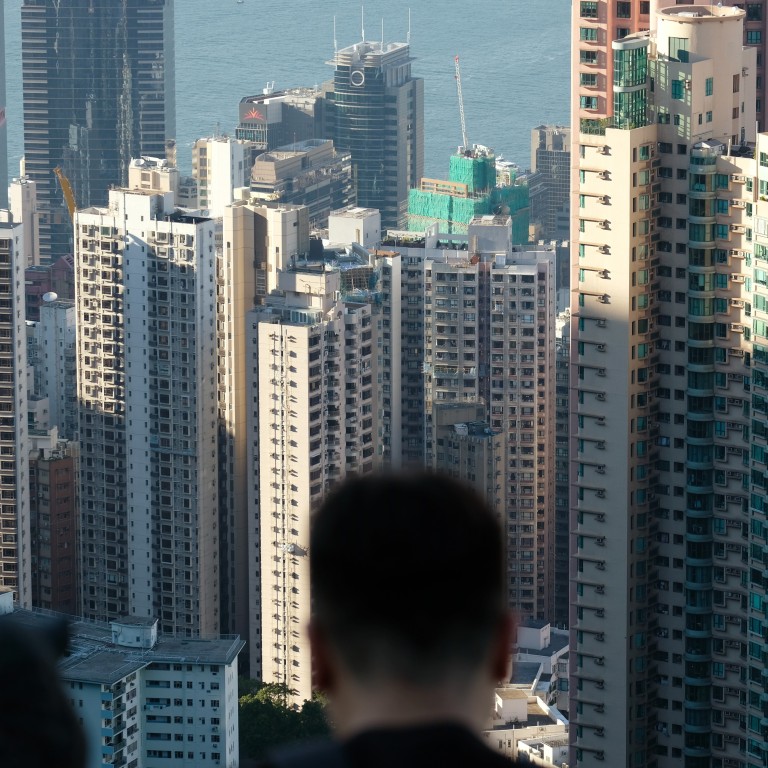
Negative equity rears head again as 262 homeowners see property values drop below outstanding loans
- The HKMA said these negative equity cases were related to bank staff housing loans or those under the mortgage insurance programme
- The number of negative equity cases could double to 600 by June if home prices continue to fall
Falling prices pushed 262 homeowners into negative equity in the fourth quarter last year, marking the first time in two years that some property values have dropped below outstanding mortgage loans, the Hong Kong Monetary Authority said on Thursday.
Home prices in Hong Kong fell 2.4 per cent in December, practically wiping out virtually all of last year’s gains, according to government data released on Thursday. Last month’s decline means house prices have slipped 9.2 per cent since they reached a peak in July.
Some small flats have lost up to 20 per cent of their value because of falling property prices, causing the negative equity trend to reappear.
Hong Kong home prices gained just 1.6 per cent in 2018, ending the year down 9 per cent from July peak, government figures show
The HKMA said these negative equity cases were mostly related to housing loans given to bank staff or to those under the mortgage insurance programme, which have higher than normal loan-to-value ratios. These type of mortgages could be as high as 105 per cent of the value of the property, compared to the normal ratio of between 50 per cent to 70 per cent.
The de facto central bank said these mortgages amounted to HK$1.18 billion (US$151.5 million), with the shortfall estimated at HK$58 million. The number represents 0.05 per cent of all borrowers and 0.09 per cent of the total outstanding mortgage value of HK$1.2 trillion.
Although the numbers may be small, banks could take a hit if the borrowers start defaulting on their loans.
Property analysts have mixed views over the outlook.
The number of negative equity cases could more than double to 600 by June if home prices continue to fall, said Raymond Cheng, head of Hong Kong and China property research at CGS-CIMB Securities.
Property purchasing power of Hong Kong’s university graduates only a quarter of those 30 years ago, thanks to high home prices
“However, the level of decline in home prices is expected to slow down in the coming months, while the pace of the US and Hong Kong interest rate rise is also expected to slow down. As such, we can expect fewer cases of negative equity [after June],” Cheng said.
Chris Leung, a lecturer in the department of finance at the Chinese University of Hong Kong, said the number of negative equity cases could exceed 1,000 in the second and third quarter figures because some factors could further dampen home prices.
“The failure of the commercial parcel sale at Kai Tak yesterday [Wednesday] reflected the market’s negative views,” said Leung.
Sharmaine Lau Yuen-yuen, chief vice-president at mReferral Mortgage Brokerage Services, also believes homeowners with negative equity could number 1,000 in the second quarter, taking it back to 2016 levels.
However, Wong Leung-sing, senior associate director of research at Centaline Property Agency is more optimistic and said that it will disappear in the second quarter.
“As Lunar New Year approaches, the property market has entered into buying season. There has been an increasing number of transactions ... the negative equity problem will go away soon,” Wong said.
David Ji, head of research at Knight Frank, is also optimistic.
“The economy is still healthy and the interest rate is low,” said Ji. “It will not be as bad as the wave of negative equity that emerged after the Asian financial crisis in 1998.”
Negative equity peaked at 105,000 households in Hong Kong in 2003, according to the HKMA.
This came after the property bubble burst as a result of the Asian financial crisis in 1998 and the peak coincided with the outbreak of severe acute respiratory syndrome (Sars) in 2003.
Next generation out to prove itself, will be more creative with property investment, says Savills
Home prices fell over 60 per cent during the period, sending negative equity to a record high. All of them had climbed out of negative equity at the beginning of 2017 after house prices increased almost sixfold in 14 years.
The HKMA also said that since the first quarter of 2011, there have been no negative equity mortgage loans that face the risk of turning into bad debt, which refers to delayed repayments for over three months.
The HKMA said its data only refers to those mortgage loans given by banks and does not include second mortgages.


